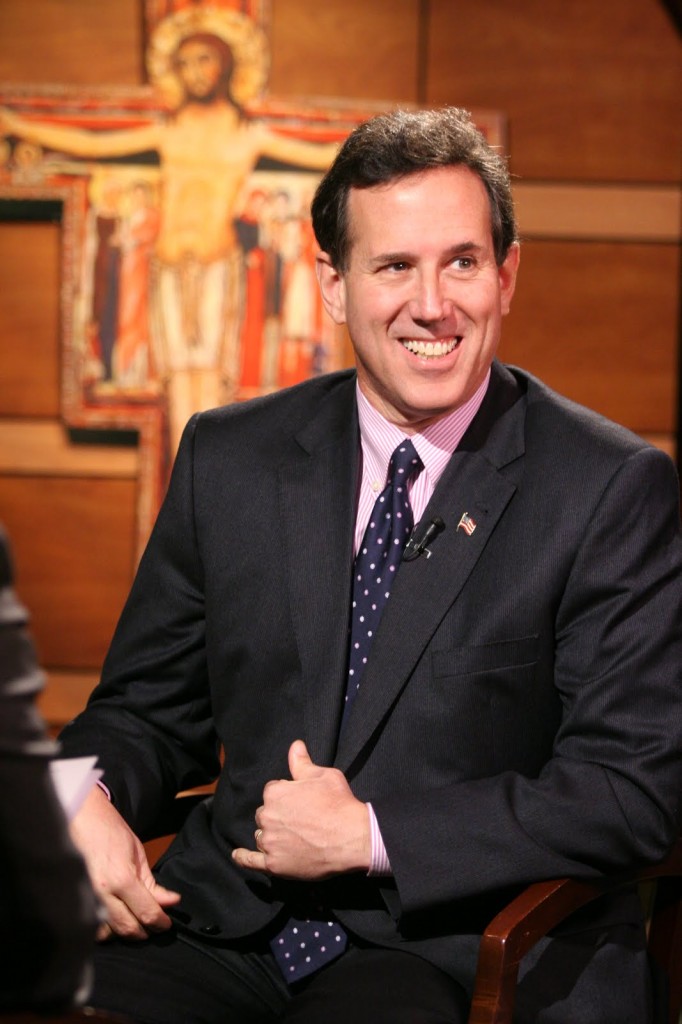Rick Santorum: bearer of the Christianist mantle
By Peter Beaumont, Thursday 5 January 2012 12.51 EST
…
Writing in 2003 the US columnist Andrew Sullivan coined a neologism “Christianist“. A Republican and Christian himself, what Sullivan meant to describe, as he explained in his blog earlier this year, was “an accelerating shift … taking place in American conservatism that was transforming the small government secular temperament into a fundamentalist religious mindset that sought its refuge not in doubting humankind’s capacity for good, but in believing in God’s ability to heal all things, including politics”.
When he wrote those words Sullivan was speaking specifically about the candidacy of Michele Bachmann of Minnesota, who ended her run for the Republican nomination following the Iowa caucus and Rick Perry of Texas, who still clings on. Instead, the Christianist mantle has been bestowed on a new figure – perhaps the embodiment of the Christianist moment in US politics – Rick Santorum.
But what do we mean by Christianist? President Ronald Reagan was a Christian who believed in the importance of faith but was not a Christianist, as being Muslim and involved in politics does not make one Islamist. Instead, like Islamism, Christianism requires the belief that biblical teaching and religious authority are also a largely political system, mandated by God.
Of all the Republican candidates, it is perhaps Santorum, who represents this explicit view of the crossover between faith and politics. A deeply conservative Catholic, he has gone far beyond what other candidates have suggested in his desire to enshrine his values in the US constitution.
Indeed, as John Nichols has pointed out in a recent article in The Nation, Santorum – whom he describes as a “social conservative extremist” – has said he would amend the constitution to ban same-sex marriage and to overturn the supreme court’s Roe v Wade ruling on a woman’s right to choose an abortion.
In other words argues Nichols, Santorum is far from being a “constitutional conservative” rather opposing the “principle, advanced by the founders, that the United States should be governed by the rule of law, not the rule of men. Quite the opposite. For Santorum, it is the rule of men – particularly rightwing evangelical men – that supersedes the rule of law as outlined in the constitution.” What Santorum represents is a convergence of a number of trends of US Republican thinking with a distinctly millennialist tendency in Christian “movement conservatives”.
Mark Lilla, writing in the New York Review of Books on recent trends in US conservative thought, has described the “mainstreaming of political apocalyptism on the right … brewing among intellectuals since the 90s, but [which] in the past four years, thanks to the rightwing media establishment and economic collapse, has reached a wider public and transformed the Republican party”.
“The big question,” argued Lilla, “was no longer how to adapt liberal aspirations to the limits of politics, but how to undo the cultural revolution of the 60s that, in their eyes, had destabilised the family, popularised drug use, made pornography widely available, and encouraged public incivility. In other words, how to undo history.”
It is a convergence – as Sullivan in an article on Christianism for Time magazine in 2006 noted – that allowed populist Republican writers like Ann Coulter to denounce her political opponents as “godless” and Tom DeLay to be able to tell supporters: “The future of man hangs in the balance. The enemies of virtue may be on the march, but they have not won, and if we put our trust in Christ, they never will.”
And Santorum is not the first to voice his desire to rewrite the constitution which makes no mention of God within its pages. In the 2008 Republican nomination cycle Mike Huckabee also spoke of his wish to rewrite the constitution to “meet God’s standards”.
Unpicking the checks and balances of the US constitutional arrangements to cement their factional world-view is not the only ambition of Christianists, who would use a revised constitution to enshrine their fatwas. There are some who believe that divine as much as human agency can solve political problems.
Earlier this year Rick Perry led a “call to prayer for a nation in crisis” in a Houston stadium, attended by 30,000 people, where he joined pastors in calling on God to solve the US economic crisis – not the first time he has tried to pray away Texas’s problems.
All of which leads to a question: whether the Christianist tendency will be a flash in the pan, unable to get real political traction, representing the fundamental weakness and lack of ideas in a broad strand of US conservative thinking or whether it will develop into a more concrete political philosophy.
And that will be revealed in how the Republican nomination process plays out in the days and weeks to come.
…
http://www.guardian.co.uk/commentisfree/belief/2012/jan/05/rick-santorum-christianist-mantle or http://bit.ly/wyxfak
Photograph: http://www.getreligion.org/2011/12/is-candidate-rick-santorum-an-evangelist/

